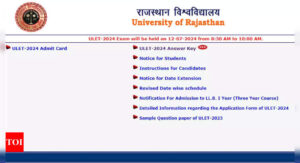[ad_1]

By Divyansh Kumar
IT companies are back on the campus for a fresh session of hiring after a brief lull. However, the companies are strategically aligning their campus hiring initiatives with specific skills tied to emerging technologies. Graduates with competencies in areas such as cloud computing, Artificial Intelligence (AI), Machine Learning (ML), cybersecurity, and more have received offer letters with competitive salary packages.
Buddha Chandrasekhar, chief coordinating officer of the All India Council for Technical Training (AICTE), highlights the shift in hiring as companies are now considering only engineering graduates with strong skills in new technologies. “The job market is evolving rapidly, with a growing demand for skills in AI/ML, data science, cloud computing, DevOps, cybersecurity, 5G/6G, blockchain, VLSI, and more. New roles are being created in the corporates, which are offering diverse roles in data science, ML with a focus on programming and emerging tech,” he tells Education Times.
Sanjeev Jain, chief operating officer, Wipro Limited, says, “The hiring environment has always been dynamic, and this evolution has been more prominent in the last 2-3 years. There is a growing need for technical expertise, including proficiency in software development, data science, AI/ML, cloud computing, and cybersecurity.”
Since every company is striving to integrate AI, the demand for AI-related jobs has increased in all sectors. “AI will work along with humans to bring synergies and deliver exponential business outcomes for organisations. AI will take over repetitive, transactional, high-volume tasks, allowing the workforce to become more strategic and realise their career ambitions as well.”
“With the launch of Wipro AI 360 strategy, 2,30,000 employees are proficient in basic Gen AI fundamentals with more than 44,000 receiving advanced AI training tailored to their roles. Besides the technologies, the new hiring is also based on soft skills, leadership skills, teamwork and problem-solving,” says Jain.
Companies are keen on hiring graduates who possess relevant experience and training in these critical areas. The evolving landscape has prompted the HEIs to transform their curricula to incorporate courses that reflect industry needs.
To equip students with these in-demand competencies, IIIT-Bangalore has implemented a curriculum that aligns closely with industry trends. “The focus has shifted towards skill-based assessments, with firms prioritising coding tests, algorithm challenges, technical interviews, and problem-solving abilities,” says Prof Debabrata Das, director, IIIT-Bangalore.
Collaboration with educational institutions
The collaboration between AICTE and IT firms is instrumental in enhancing student employability. The technical education regulator is implementing various initiatives to ensure graduates acquire employable skills. “We collaborate with industry partners to design relevant curricula and support certification courses in emerging technologies such as AI and cybersecurity,” says Chandrasekhar. This partnership helps refine training programmes based on industry feedback, bridging the gap between academia and the job market.
Wipro has collaborated with academia, tech and education partners, and startups to ensure effective training for the next generation of associates. It has also collaborated with IIT Delhi, IIT Patna, IISc Bengaluru, as well as the University of Maryland and the University of South Carolina to advance R&D. “We have also established Centres of Excellence in many leading regional universities like Amity University, Anna University, Chitkara University etc,” says Jain.
Vishal Khurma, CEO, Woxsen University, Hyderabad, says that internships offered by industries have increased in the last year. The placement model for the first BTech batch has been based on internships, which were converted into full-time jobs. “Internships offered valuable work experience to support a seamless transition into the workforce. This approach has yielded a remarkable 100% placement track with our BTech pilot batch,” says Khurma.
Anil Joseph Pinto, registrar, Christ University, Bangalore, notes that internship and job opportunities currently focus on data analytics, cloud computing, and cybersecurity, reflecting a shift from traditional IT roles towards specialised tech skills over the past year. Prof Pinto says that Christ University has been collaborating with IT firms by organising workshops, hackathons, and internship fairs, and maintaining industry-specific partnerships to facilitate placements.
Changing hiring trends
Kakandikar Ganesh, associate dean of external relations at MIT-WPU, Pune, says, “Corporates are engaging freshers by involving them in internships. There are three modes of internships being offered: Internship, Internship + PPO (Pre-Placement Offer), and Performance-based Internship + Job. These opportunities enable freshers to enhance their technical capacity while gaining exposure to industry culture.”
The expectations of IT employers regarding graduate qualifications and skills have seen a notable shift. Prof Ganesh adds that all recruiters are looking for specialised skills along with graduation, highlighting that freshers must be equipped with at least one global certification prior to joining the company.
Ashish Munjal, co-founder and CEO of Sunstone, a higher education company that works with top colleges and recruiters across India, emphasises the need for a well-rounded skill set in today’s dynamic workplace. “We prioritise preparing students to develop a strong foundation in both technical and soft skills. Our focus areas include data management, product management, problem-solving, communication, and adaptability,” he explains.
Preparing students for success
To prepare students for campus placements, the educational institutes are offering personalised training programmes, mock interviews, resume-building workshops, industry mentorship, and career coaching.
Acknowledging that the past year was challenging for both education and the IT sector, Ashok Kumar Mittal, chancellor, Lovely Professional University says, “Over the years, we have built specialisations within our Computer Science and Engineering programme, focusing on areas like cybersecurity, data science, and AI. IT employers have elevated their expectations regarding graduate qualifications and skills, particularly for candidates from engineering and computer application domains including students of circuit and non-circuit branches.”
[ad_2]
Source link




